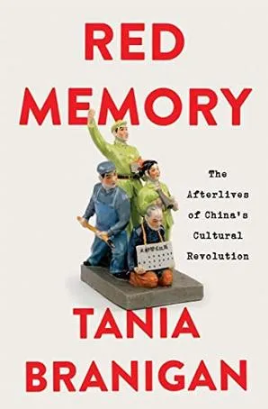At First Things, Robert Carle reviews Tania Brannigan’s Red Memory: The Afterlives of China’s Cultural Revolution:
At a 1979 White House dinner, actress Shirley MacLaine told Deng Xiaoping, China’s new leader and the guest of honor that evening, about a Chinese scientist she had met. He said that he’d been happier and more productive when he worked on a Chinese farm. Deng cut her short: “He lied. That was what he had to say at the time.” Deng spent three years working in a tractor factory during the Cultural Revolution, and he refused to romanticize it. The memoirs of Cultural Revolution survivors written in the 1980s echo Deng’s view that it was a brutal and pointless experiment.
Today, there is widespread nostalgia in China for the Cultural Revolution. President Xi Jinping has reflected positively on the time he spent exiled in the remote town of Liangjiahe in Shaanxi province, living in a cave, hauling coal carts, carrying manure, building dikes, enduring bitter winters, flea bites, and hunger. This experience, Xi claims, bonded him with China’s common people and prepared him to be an empathetic ruler. Liangjiahe is now a “red tourist” attraction where students can visit Xi’s old home and admire the well he built.
Xi’s glamorization of the Cultural Revolution is reflected in Beijing’s chic dining scene. In Red Classics Restaurant, for example, waitresses in Red Guard uniforms serve meat and vegetables in plain style to invoke an era of stark living. You can have a fully themed wedding in this restaurant, posing for photos in matching Mao suits on a tractor parked in one corner.
In her new book, Red Memory, Tania Branigan describes the clashing memories of the Cultural Revolution. Those who suffered under the brutality of the Red Guard describe an infernal decade when Mao turned his murderous paranoia on his own people, leading them to tear each other to pieces. Children denounced their parents, and students murdered their teachers. In Mao’s campaign against the four “olds” (Old Ideas, Old Culture, Old Customs, and Old Habits), traditional Chinese culture and morality became targets for destruction.
But Branigan also tells stories of people who are nostalgic for a time when life was more austere and when people lived for a cause other than individualism and materialism. Some former Red Guards have set up a bookstore and website called Utopia. Others organize trips to North Korea to admire society as it should be, or set up rural communes for students. One Utopia co-founder, a professor, made headlines for slapping an eighty-year-old “traitor” who had dared to criticize Mao.
Red Memory is full of chilling stories of brutality and betrayal. Fang Zhongmou witnessed the torture and beating of her husband by adolescent Red Guards. She endured years of interrogations at her workplace because her father had been a landowner. One night in 1970, while doing laundry at home, she launched into a tirade against Mao. Her son told her, “If you go against my dear Chairman Mao, I will smash your dog head in”. He reported her to officials. After two months of violent “struggle sessions”, Fang was executed. The son grew up to be a guilt-ridden adult who agonizes over his mother’s gravesite.
Song Binbin was eighteen when she viciously denounced her school’s deputy principal, Bian Zhongyun. Bian had told the students that they should run out of the building in the event of an earthquake. Because she did not instruct the students to take Mao portraits with them, Red Guards hunted her down and beat her to death with nailed clubs. As the Cultural Revolution swept China, beatings and executions became increasingly baroque. Students poured boiling water over teachers’ heads and made them swallow excrement, crawl over embers, drink ink and glue, and beat one another.




